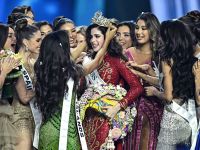Pakistanis on Sunday cast their first votes since last year's military coup in the first phase of polls designed to restore democracy by October 2002.
Some nine million people out of a population of around 140 million will vote in the first stage of the village, or union, council elections, organised under military ruler General Pervez Musharraf's bold "devolution plan."
Polling was held in 18 of the country's 106 districts, with the state-run news agency reporting strong interest despite fears turnout would be low.
"The voting is picking up pace fast, while it is reported to be brisk at certain polling stations already. An unprecedented enthusiasm among voters is being witnessed," the Associated Press of Pakistan reported.
Musharraf, who toppled prime minister Nawaz Sharif in a coup in October last year and sent him into exile earlier this month, has vowed to restore "genuine democracy" and bring power to the "grassroots."
In a ruling by the supreme court in May, he was given three years from the date of the October 12 coup to hold general elections and step aside for a new civilian government.
His devolution plan, part of "revolutionary" reforms to end "sham democracy," envisages a new three-tier system of government with a third of seats at the village and district level reserved for women.
Minorities and the labouring classes are also guaranteed certain numbers of seats.
Instead of welcoming the start of the country's return to democracy, political parties are furious at being banned from participating in the elections.
They accuse Musharraf of trying to re-write the electoral rules to boost the power of the central government and the military.
"These elections will not bring any revolution but polls on a non-party basis will further divide the nation into castes, sects and ethnic groups," Pakistan Muslim League supreme council chairman Raja Zafarul Haq said.
"The lack of enthusiasm and interest shown in these elections has proved that people still have faith in the parliamentary form of democracy."
The Pakistan Election Commission this month announced a 25-point "code of ethics" barring candidates from holding public meetings, leading processions, waving flags or even displaying banners.
Pakistan People's Party (PPP) Sindh provincial president Nisar Khuro said: "It is a one step forward and two steps backward kind of system, which will lead us nowhere.
"I don't expect more than 15 percent turnout because the candidates have even been barred from arranging transport to bring the voters to the polling stations."
Khuro also alleged the military was planning to rig the outcome of the vote.
"They will announce the results after six days, which itself indicates that those candidates who enjoyed the support of anti-government parties will not be declared winners," he said.
Fundamentalist Jamaat-e-Islami party deputy chief Ghafoor Ahmed said the army had no role to play in politics.
"They have been doing experiments for the past 53 years as to which political system suited the country, without realizing that it is not their job," he said.
More local body elections will be held in the new year, followed by district and provincial polls leading up to promised general elections before October 12, 2002.
"I am confident that it is a revolutionary step and a revolutionary move," Musharraf said in an address to the nation this month.
"Through this system, we intend to make the people of Pakistan masters of their own destiny. We want people to take their destiny into their own hands."
The general has crisscrossed the country in recent weeks, imploring people to vote for upright candidates and resist party pressure -- KARACHI (AFP)
© 2000 Al Bawaba (www.albawaba.com)







